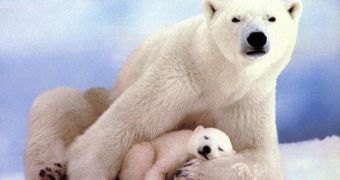The British Ecological Society's Journal of Animal Ecology has recently witnessed the publication of a new study claiming that the polar bears inhabiting the regions of western Hudson Bay are now facing starvation because of climate-induced changes in the local sea ice.
Wildlife researchers argue that, over the years, these polar bears have grown accustomed to living either on ice or on land, depending on the seasons.
Thus, when going about their business on sea ice, the bears can hunt seals and put on some weight.
These extra pounds later on help them survive on land once summer arrives and the local ice melts in its entirety.
Because of climate change and global warming, the sea ice in Hudson Bay is beginning to both thaw earlier and freeze later than it did in previous years.
As explained by the Alpha Galileo Foundation, this means that the polar bears in this part of the world must either change their migration patterns and feeding habits in order to adapt to their new surroundings, or risk dying of starvation due to their being unable to get hunt seals as often as in the past.
“Climate-induced changes that cause sea ice to melt earlier, form later, or both, likely affect the overall health of polar bears in the area. Ultimately, for polar bears, it’s survival of the fattest,” argued Dr. Seth Cherry, a researcher now working with the University of Alberta.
“The data suggest that in recent years, polar bears are arriving on shore earlier in the summer and leaving later in the autumn. These are precisely the kind of changes one would expect to see as a result of a warming climate and may help explain some other studies that are showing declines in body condition and cub production,” Dr. Seth Cherry went on to argue.
Several previous reports issued by conservationists and wildlife researchers argue that Hudson Bay is currently home to about 900 polar bears.
However, it appears that, because of climate change and global warming, their overall health is taking a turn for the worse and considerably fewer cubs make it to adulthood.

 14 DAY TRIAL //
14 DAY TRIAL //